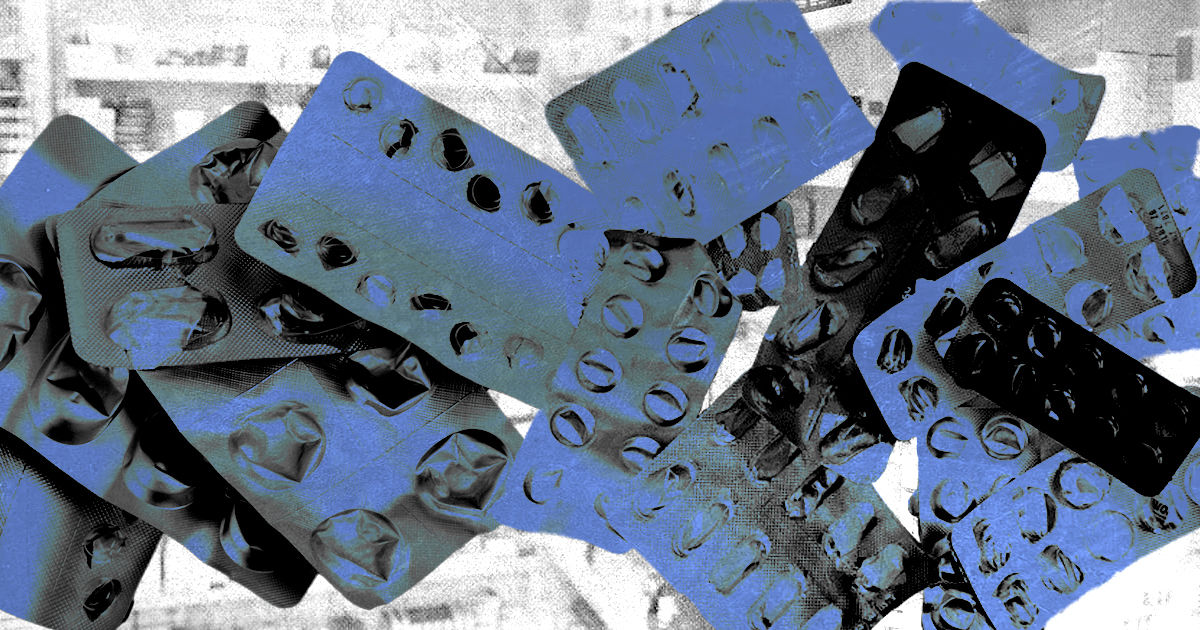Maldives medicine shortage persists despite government intervention
Only 40 percent of patients get full prescriptions.

Artwork: Dosain
11 Jun 2025, 13:28
At last weekend’s Eid parade in Kulhudhuffushi, mock pharmacy floats stocked with coconut water and poetry books drew knowing laughter from across the country. The joke hit close to home.
The queue outside the State Trading Organisation’s pharmacy in Malé bore testament to the reality: patients traded stories about which medicines they could not find, some clutching partially filled prescriptions, others walking away with nothing.
The Maldives Independent spoke to 25 patients or family members who came out of the STO pharmacy in Henveiru. Only 10 got all their prescribed medication from the capital’s main government outlet.
For the rest, at least two medicines on their prescriptions were unavailable, ranging from panadol syrup for children, acid reflux pills, and medications for chronic illnesses like diabetes and heart disease as well as other drugs that are not "widely used."
Complaints and queries on medicine availability continue to pile up on social media. "In STO pharmacy queue. None of the people ahead of me got all their meds," a person posted on X. "Where will I get these medicines? From Aarah or Muleeaage?" another asked, referring to the presidential retreat island and the official residence.
Our investigation in February explored the confluence of factors behind the acute shortage that has persisted since the beginning of 2024. The compounding set of circumstances included millions in delayed health insurance payments that left importers without purchasing power; new price controls that made it unprofitable to stock certain medicines; strict regulatory requirements that made it difficult to import medicines for the Maldives' small market.
The crisis has somewhat abated since then – when even life-saving drugs were in short supply and families posted desperate pleas seeking contacts abroad – but patients are still struggling to source some medications, doctors told the Maldives Independent.
"I think from this time last year and the end of 2024, the situation has improved. Most essential medicine is available. But if you are comparing to pre-Covid-19 and even immediately after the end of the special measures, it is still not the best situation," said an emergency room practitioner at the Indira Gandhi Memorial Hospital.
The previous medicine shortage caused by border closures and other pandemic restrictions had been resolved by 2021, according to medical professionals.
Pharma mafia
Despite evidence pointing to policy decisions as the origin of the crisis and the announcement of sweeping corrective measures, President Dr Mohamed Muizzu has continued to blame a "medical mafia" for the shortage.
Privately-owned pharmacies stopped importing medicine in retaliation to the government capping the prices of some 250 "widely used" medicines under the Aasandha health insurance scheme, Muizzu said in February. "These businesses were making 1,000 percent or 2,000 percent profit through Aasandha, with taxpayers money. That is very wasteful," he said.
The president doubled down on the claim on his official podcast and during last month’s marathon press conference. To tackle the alleged price gouging, STO will import all the drugs on the approved drug list by April 15, Muizzu announced.
But the state-owned importer has been facing sourcing challenges.
"There have been delays because STO does not actually have enough contacts to source everything on that list," a President’s Office official told the Maldives Independent.
The president has considered alternatives such as potentially setting up a new state-owned enterprise specifically to source, import and supply medicine. However, this plan appears to be on hold for now, the official said.
Owners of small retail pharmacies have also questioned STO's ability to supply enough medicine to cater to the Maldivian population. "They don't have stock to wholesale,” a pharmacy owner said after a March deadline to source all essential medicines. "We are calling them every week. They are still telling retailers they don't have enough stock to wholesale," a pharmacy owner from Malé said at the time.
Last month, STO signed an agreement with India's HHL Lifecare to source and import medicine.
"Under this agreement, the Maldives will have access to medicine that the country has been facing difficulties obtaining,” STO said in a statement.
“While a temporary solution has been provided for the current shortage of basic medicine in the Maldives, the partnership with HLL aims to ensure a permanent solution to this problem, and all the medicine will be imported by WHO standards and import regulations.”
Discussion
No comments yet. Be the first to share your thoughts!
No comments yet. Be the first to join the conversation!
Join the Conversation
Sign in to share your thoughts under an alias and take part in the discussion. Independent journalism thrives on open, respectful debate — your voice matters.




